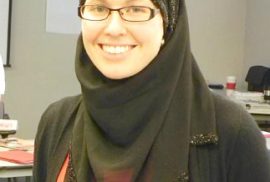
“What people need to understand is that at the heart of it, this isn’t a new story. The recent conflict in Rakhine isn’t something that just started in the summer of 2012. There is a historical legacy of persecution against the Rohingya community in Rakhine that dates back decades. Framing this as a religious issue of Buddhism vs. Islam belies its complexity. Instead we see ethnic Rakhine staking a claim for political space and natural resources and ‘protecting’ and ‘defending’ their identity. Add strong elements of racism, discrimination, the complete failure of anyone inside Burma to seek realistic solutions, the interests of self-serving politicians looking at elections in 2015, and the self-serving interests of the international community into the mix, and you have what is happening right now – an entire community consisting of hundreds of thousands of people, namely the Rohingya, being treated as if they are not even human.”


 PEREBUTAN RI-1 semakin menarik ketika masing-masing kubu—baik Prabowo Subianto maupun Joko Widodo—berhasil menarik gerbong yang memiliki hubungan dengan kiai dan pesantren. Tidak bisa ditampik bahwa restu kiai memiliki nilai dan diduga kuat bisa menjadi penarik massa pemilih.
PEREBUTAN RI-1 semakin menarik ketika masing-masing kubu—baik Prabowo Subianto maupun Joko Widodo—berhasil menarik gerbong yang memiliki hubungan dengan kiai dan pesantren. Tidak bisa ditampik bahwa restu kiai memiliki nilai dan diduga kuat bisa menjadi penarik massa pemilih.

 Islam and politics has been difficult to separte. This is reflected in the situation in some Muslim countries, such as Mali and Somalia where violent struggles have shifted to periphery. In other regions, revolutionary movements like the Arab Spring were hampered by the politics of religion. On February 19, 2014, Dr. Andreas Radtke, the political counsellor in German Embassy in Jakarta, Indonesia, discussed these issues of political Islam in global terms at the regular Wednesday Forum lecture series hosted by CRCS and ICRS.
Islam and politics has been difficult to separte. This is reflected in the situation in some Muslim countries, such as Mali and Somalia where violent struggles have shifted to periphery. In other regions, revolutionary movements like the Arab Spring were hampered by the politics of religion. On February 19, 2014, Dr. Andreas Radtke, the political counsellor in German Embassy in Jakarta, Indonesia, discussed these issues of political Islam in global terms at the regular Wednesday Forum lecture series hosted by CRCS and ICRS.